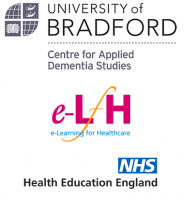Dementia Risk, Reduction and Prevention for Medical Doctors



This session looks at how behaviour in adult life may link with risks of developing certain types of dementia and how lifestyle change may delay onset or slow progression. It examines what factors affect people's ability to make lifestyle changes, how to convey key messages and how to signpost people to support for making changes.
Learning Objectives
By the end of this session you will be able to:
- List the lifestyle factors that may increase the risk of developing certain types of dementia
- Describe how lifestyle changes may delay the onset of dementia
- List motivational factors that may impact on the ability to make changes in lifestyle
- Explain the challenges to healthy living that may be experienced by different socio-economic and/or ethnic groups
- Signpost people or groups to sources of health promotion information and support
- Effectively communicate messages about healthy living according to the abilities and needs of individuals
This session will investigate how lifestyle may influence the risk of developing dementia, how lifestyle changes can reduce risks and what affects people's ability to make the necessary changes. It will consider how the ability to make changes is influenced by a person's social and financial resources and their cultural context. Finally, the session will provide information about how to tailor effective messages regarding healthy living and where to signpost people for information and support that will help them to make lifestyle changes to reduce dementia risk.
This session has been mapped to the Dementia Training Standards Framework and is designed to support the Dementia Action Alliance Dementia Statements.
Before commencing this session you may wish to complete:
- Module 1 – Introduction to Living with Dementia/Dementia Awareness (407-0030)
Jan is Professor of Dementia Care at the University of Bradford and a registered clinical psychologist with many years of NHS experience working with people with dementia, depression and anxiety, and their families.
Her current research focuses largely on developing our understanding of ways to support people with dementia and their families in the community. She has researched and written about caregiving, with much of her work being based on qualitative methodologies.
During 2013-2014, she co-organised dementia awareness roadshows for diverse communities in Bradford funded by Bradford City Council, an initiative that was highly commended in the recent European Foundations Initiative on Dementia. She was also a Wellcome Trust scientific adviser to the director of a television programme being made for children about having a grandparent with dementia.


Sahdia is a Senior Research Fellow at the Centre for Applied Dementia Studies, University of Bradford. Her current research is funded by the Alzheimer's Society and focuses on carers' motivations, willingness and perceived preparedness to support a person with dementia at home. Sahdia is interested in perceptions of health, ways of coping, service use and quality of life in minority ethnic communities.
Sahdia completed a BSc (hons) in psychology and neuroscience, MSc in Clinical psychology and a PhD in Health psychology from Bangor University. She has a background in health psychology research and has conducted research in the following areas: health services, medicine adherence, patient safety, patient and public engagement. Her particular interest is in dementia research.
- Surgery | Common Surgical Conditions | General Sur...
- Posted By eIntegrity Healthcare e-Learning
- Posted Date: 2024-11-14
- Location:Online
- This session outlines the presentation, investigation and management of causes of dyspepsia.
- 02_07 General Surgery Dysphagia
- Posted By eIntegrity Healthcare e-Learning
- Posted Date: 2024-11-14
- Location:Online
- This session outlines important principles in the definition, causes, assessment and investigation of dysphagia, a significant symptom which warrants urgent evaluation.
- Surgery | Common Surgical Conditions | General Sur...
- Posted By eIntegrity Healthcare e-Learning
- Posted Date: 2024-11-14
- Location:Online
- This session outlines the aetiology, investigation, and management of common and serious conditions causing bleeding originating from the rectum and anus. It also revises the 2 week-wait referral guidelines for suspected lower GI cancer.
- Surgery | Common Surgical Conditions | General Sur...
- Posted By eIntegrity Healthcare e-Learning
- Posted Date: 2024-11-14
- Location:Online
- This session will describe the approach to the patient with suspected lower gastrointestinal haemorrhage including immediate management, investigation, aetiology and definitive treatment.
- Surgery | Common Surgical Conditions | General Sur...
- Posted By eIntegrity Healthcare e-Learning
- Posted Date: 2024-11-14
- Location:Online
- Upper gastro-intestinal bleeding is a common and sometimes life threatening problem. This session discusses the symptoms, causes, resuscitation, scoring and further management of these patients.







